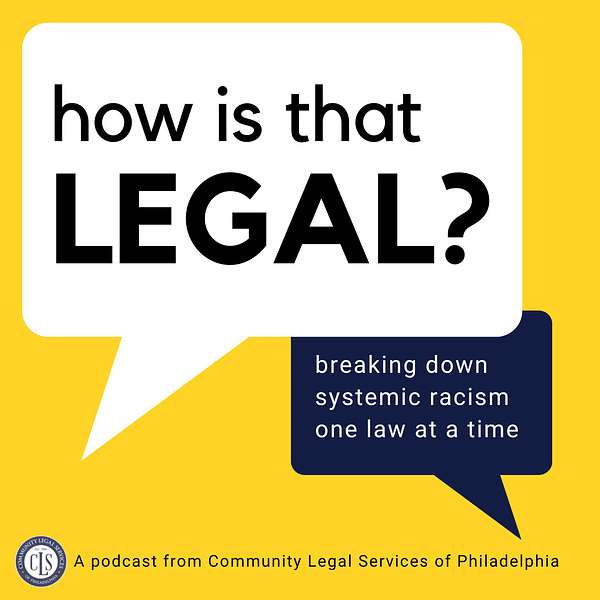
How Is That Legal?: Breaking Down Systemic Racism One Law at a Time
How Is That Legal?: Breaking Down Systemic Racism One Law at a Time
Introducing 'How Is That Legal?'
Kee Tobar and expert guests break down examples of systemic racism in the law and policy. By the end of each episode, you’ll understand the forces behind everyday injustices that make us ask, “How in the world is that legal?” In our first season, How Is That Legal will examine racial disparities in the child welfare system, housing discrimination, Medicaid estate recovery, utility shutoffs, and more.
If you enjoy this show and want to help fight poverty and injustice, consider making a donation to Community Legal Services today! You can also follow us on Twitter @CLSphila to stay connected.
How Is That Legal is a podcast from Community Legal Services of Philadelphia and Rowhome Productions. Jake Nussbaum is our Producer and Editor. Executive Producers are Alex Lewis and John Myers. Special thanks to Caitlin Nagel, Zakya Hall, and Molly Pollak. Music provided by Blue Dot Sessions.
Kee Tobar:
Hello, everyone. I'm Kee Tobar. I'm a civil legal aid attorney, history enthusiast, and chief equity and inclusion officer at Community Legal Services of Philadelphia. Welcome to How Is That Legal? The podcast where we break down examples of systemic racial inequity in the law and policy and talk to experts whose stories of injustice will make you ask, how in the world is that legal?
As a civil legal aid attorney at Community Legal Services of Philadelphia, I help fight egregious examples of injustices in the civil legal system. CLS advocates help clients when they face the threat of losing their homes, incomes, healthcare, and even their families, oftentimes for no other reason than being poor or black or brown or immigrant or the intersections thereof. We know that's true, and yet and still, it's difficult to get to the bottom of these disparities. I mean really, how is the whole system legal?
How is it legal that more than one in 10 black children in America will be forcibly separated from their parents and placed in foster care by the time they reach age 18? How is it legal that an eviction filing, not even a determination, can disproportionately lock black women and their children out of housing opportunities indefinitely? How is it legal to snatch away a family's opportunity for generational wealth through home ownership due to a decade's past unpaid water bill? Well, that's exactly why we started this podcast, to break down the specific ways the legal system perpetuates racial inequity, and do so in a way that you can understand.
Rasheedah Phillips:
Out in the field, there's a black tax when you're going to rent. There's added costs that get put on. You get a different type of lease agreement, in some cases, than other people do because of the criminality of blackness.
Dorothy Roberts:
Bringing police into their communities, arresting them, incarcerating them, by denying them any guaranteed support, income, for their children, and then by terminating their parental rights and putting their children up for adoption. None of that actually works, of course, to solve the problem of poverty in black communities.
Dwayne Royster:
I've talked to religious leaders and folk in congregations all across the state, and people are like, "Yeah, you know, that's not really number one issue." Oh, how many people in your congregation have diabetes? Or how many children in your congregation suffer with asthma? That's all related to environmental stuff, right? It's not just a precondition because you're black or brown that you're going to have these diseases, although there's some of that there, but also the environmental conditions that you're in are having an impact on that as well.
April Lee:
I've had cases where a family reunified and they say, "Oh, well, mom don't have any food. So let's send this mass email and try to pull her back into court because she's low on food." And for me, I'm like, this don't make no sense. I'll go shopping right now before you spend thousands of dollars taking her back and forth to court because she have a food insecurity.
Kintéshia Scott:
Philadelphia has a lot of organizing power in this city. It's an incredible wealth of resources and dedication to a lot of people who just want to see this city move forward. So I think that as long as we engage and elevate those voices as much as we can in our work, that that's the best thing that an organization like Community Legal Services can do.
Kee Tobar:
Our expert gifts come from a wide range of backgrounds and experiences. They'll walk us through history and put names to the laws and policies that create the disparities we see every day. But I promise not to leave you stuck with knowledge and without solutions. We'll also talk about what's currently being done and what must be done to create a world free of injustice. And that's the part I'm really excited about. It's a conversation you won't want to miss. So be sure to subscribe to How Is That Legal wherever you get your podcasts.
How Is That Legal is produced by Rowhome Productions. Jake Nussbaum is our producer and editor. Executive producers are Alex Lewis and John Myers. Music provided by Blue Dot Sessions. Special thanks to Zakya Hall, Caitlin Nagel, and Molly Pollak. I'm your host Kee Tobar.
